|
|
|
Sort Order |
|
|
|
Items / Page
|
|
|
|
|
|
|
| Srl | Item |
| 1 |
ID:
156080
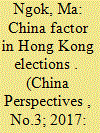

|
|
|
|
|
| Summary/Abstract |
The China factor has always been a significant structural, ideological, and organisational factor in Hong Kong elections. Since 2003, the deepening of intervention by Beijing and its Liaison Office in Hong Kong meant that the China factor as an organisational force became increasingly salient in elections. It also drove more people, especially young people, to resist China’s control and take the road of supporting independence or self-determination. The 2016 elections showed more ostensible intervention by the Liaison Office, and independence became a new campaign issue. The China factor will continue to be an integral part of Hong Kong elections in years to come.
|
|
|
|
|
|
|
|
|
|
|
|
|
|
|
|
| 2 |
ID:
156081
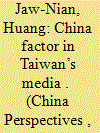

|
|
|
|
|
| Summary/Abstract |
To investigate how the Chinese government extends its influence to manipulate extra-jurisdictional media, this case study investigates Taiwan’s experience. It suggests that as Taiwanese media companies become embedded in the Chinese capital, advertising, and circulation markets, the Chinese authorities increase their ability to co-opt them with various economic incentives and threats, leading to self-censorship and biased news in favour of China. Using process tracing as the principal method, and archives, interviews, and secondary literature as principal data sources, the study supports the transferability of the “commercialisation of censorship” beyond China. Liberal states around China must design institutions protecting the media from inappropriate intervention by both domestic and foreign political and economic forces.
|
|
|
|
|
|
|
|
|
|
|
|
|
|
|
|
| 3 |
ID:
156083
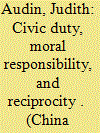

|
|
|
|
|
| Summary/Abstract |
This paper, which is based on ethnographic field research, analyses the system of resident-volunteers in the neighbourhoods of Beijing. Between co-optation networks, surveillance missions, ritualised practices, and ordinary exchanges of sociability amongst neighbours, volunteering is an interesting form of citizen participation in urban China. The volunteer networks are made up of inhabitants who are selected and involved through the norms of civic duty, personal acquaintance, moral obligation, or persuasion, in order to contribute to the production of local public order. Finally, this specific form of voluntarism reveals, from the perspective of retired people, how shared socio-political practices are created and perpetuated within an institutional volunteering system.
|
|
|
|
|
|
|
|
|
|
|
|
|
|
|
|
| 4 |
ID:
156079
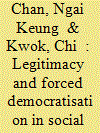

|
|
|
|
|
| Summary/Abstract |
Social movements are voluntary events whose participants have the right to leave whenever they disagree with their leaders. For this reason, the legitimacy of social movements is often perceived as inherent and thus of only secondary importance. This article aims to repudiate this view by demonstrating that legitimacy issues can impose constraints and have significant impacts on the relationships and decisions of the leaders of social movements. In the case of the Umbrella Movement, bottom-up legitimacy challenges to movement leaders’ authority not only forced the leaders to reform their decision-making structure and even implement direct democracy, but also intensified the relationships among the leaders of different factions, ultimately undermining the leadership’s overall effectiveness.
|
|
|
|
|
|
|
|
|
|
|
|
|
|
|
|
| 5 |
ID:
156082
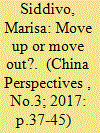

|
|
|
|
|
| Summary/Abstract |
China is equipping itself with a mid-long-term strategy to sustain its manufacturing sector in the face of potential challenges brought about by “disruptive” technologies. According to most analysts, disruptive technologies such as 3D printing, the Internet of things (IoT), big data, and robotics are going to modify the “shop floor” and re-allocate the functions and roles of firms empowered in the global value chains (GVCs). In China, scholars, state officials, and the entrepreneurial community have profoundly analysed the impact that disruptive technologies can exert on their firms’ role in the global value chains, reaching the conclusion that the country has to frame a policy to hedge that risk. This paper aims to provide an overview of the debate stirred up by the confrontation of the national manufacturing sector with the introduction of new technologies. The debate, which has involved many institutional and economic actors, has influenced the industrial plans recently drawn up by the Ministry of Industry and Information Technology (MIIT).
|
|
|
|
|
|
|
|
|
|
|
|
|
|
|
|
|
|
|
|
|